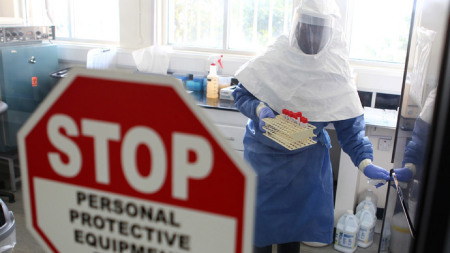Two-Year-Old Guinea Boy Believed to Be Patient Zero in Ebola Outbreak; Scientists Hope Vaccine Ready by 2015

A two-year old boy from Guinea who died in December is suspected to be patient zero in the current outbreak of Ebola virus in West Africa, which has killed over 960 people. Scientists are meanwhile hoping that the first vaccine against the deadly disease will be ready by 2015.
The boy, who wasn't named, apparently fell ill in a village in Guéckédou in southeastern Guinea, which is in the intersection with Sierra Leone and Liberia, giving the disease an entry point in all three countries. The New York Times reported that the boy died on Dec. 6, and a week later Ebola killed the boy's mother, his 3-year-old sister, and his grandmother. The family displayed symptoms of the virus, including fever, vomiting and diarrhea, but did not identify Ebola as the reason.
Two mourners at the grandmother's funeral reportedly carried the virus home to their village, while a health worker there carried it to yet another village. By March, when the Ebola outbreak was recognized by the World Health Organization, dozens of people had died in eight Guinean communities, and suspected cases were being announced in Liberia and Sierra Leone.
Ebola, which is spread through bodily fluids such as saliva, sweat, blood and urine, has killed 961 people so far out of 1,779 cases, WHO reported in its update last week. Cases in the deadliest ebola outbreak in history have also been reported in Nigeria, with health workers urgently working on treatment and containment efforts, while scientists have said that the first vaccine against Ebola could be ready by 2015.
Jean-Marie Okwo Bele, the head of immunization and vaccines at the WHO, told French radio broadcaster RFI that "since this is an emergency, we can put emergency procedures in place... so that we can have a vaccine available by 2015."
Marie-Paule Kieny, Assistant Director General of WHO, told AFP ahead of clinical trials that a vaccine by 2015 is a "realistic" goal.
British pharmacy company GlaxoSmithKline has said that it will begin trials next month, having began its development of an Ebola vaccine in May 2013.
"We are working with the US National Institutes of Health's Vaccine Research Center (VRC) to advance development of an early stage vaccine candidate for Ebola. GSK acquired the vaccine candidate when we purchased Okairos in May 2013," the company explains on its website.
"In collaboration with VRC, we have evaluated this vaccine candidate in pre-clinical studies and we are now discussing with regulators advancing it to a phase I clinical trial programme later this year."
Two American missionaries working in Liberia who were infected by the disease are recovering after being flown home to the U.S. and treated with a serum called ZMapp, which had only been tested on animals before.
The infected countries meanwhile continue taking steps to try and contain the virus, with Guinea closing its borders with Sierra Leone and Liberia on Saturday.
"We have provisionally closed the frontier between Guinea and Sierra Leone because of all the news that we have received from there recently," health minister Rémy Lamah said, noting Guinea had also closed its border with Liberia, The Guardian reported.
At least 367 people have died in Guinea alone since the outbreak spread in March, while 18 others are currently being treated in isolation.
The decision to close the borders was reportedly taken in consultation between the three countries, according to Moustapha Koutoub Sano, Guinea's minister for international co-operation.
Major airlines have banned flights into West Africa late in July, including airline Asky, which explained that its decision to stop flying into Liberia and Sierra Leone was made aimed at keeping "its passengers and staff safe during this unsettling time."
Nigeria's largest airline, Arik Air, also banned flights to Liberia and Sierra Leone as a response to the outbreak.





















